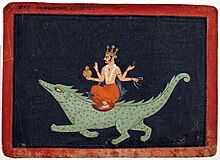Rita (Hinduism)
Rita ( Sanskrit : ऋत ṛta n. "Truth, Law, Order") is a central term of the Vedic period and describes the natural, religious, concrete and moral order of people and society. All beings are bound to Rita, humans, animals, plants and gods. It is the order of both heaven and earth.
The term is closely related to the two deities Mitra and Varuna , who appeared as their guardians and guardians. Although this is one of the most important concepts of the Vedic period, in contrast to other gods, Rita does not appear as a personified deity, but as a purely abstract principle. Rather, it is represented by other gods who take care of the maintenance and supervision of the Rita. Thus, in a sense, Rita also stands above the gods themselves, who have to submit to him and in a sense serve him. Rita is also closely related to the sacrifices and rituals of the kings and brahmins who are supposed to imitate, confirm, maintain and guarantee the world order of Rita. “Everything for the Rita and everything through the Rita” is a saying of the Vedic times.
Mitra and Varuna
Inextricably linked to Rita are the two Vedic gods Mitra and Varuna, who appear as his guardian and guardian and ensure that it is observed and maintained. Those who stick to Rita will be rewarded, but sinners will be punished. Varuna punishes sinners with dropsy and keeps them trapped in his noose.
Dharma
In today's Hinduism , the term Rita no longer appears and has largely been replaced by the term Dharma , which is particularly associated with Vishnu . In contrast to the rita, dharma is rather associated with concepts such as the caste system, karma, moksha and samsara, which did not yet exist in the Vedic era.
literature
- Jan Gonda: The Religions of India, Vol. 1: Veda and older Hinduism . W. Kohlhammer Verlag, Stuttgart 1960.
- Hermann Oldenberg : The religion of the Veda . Magnus Verlag, Stuttgart 1983, ISBN 3-88400-128-0 , pp. 195f. (identical reprint from Hertz edition, Berlin 1894; Internet Archive)
Individual evidence
- ↑ Archived copy ( Memento of the original from May 23, 2012 in the Internet Archive ) Info: The archive link was inserted automatically and has not yet been checked. Please check the original and archive link according to the instructions and then remove this notice.
- ↑ a b c Jan Gonda: Indra . In: Ders .: The Religions of India, Vol. 1: Veda and older Hinduism . W. Kohlhammer Verlag, Stuttgart 1960.
